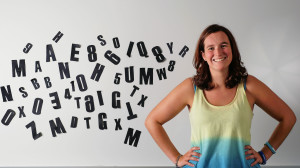UMW junior Megan McLaughlin left a clue to her future in her middle-school yearbook.

It’s right there on page 28. Above her lucky number and favorite memory. Below her black-and-white photo, all shoulder-length hair and innocent eyes.
“Ambition: Doctor.”
For McLaughlin, making her way toward the medical field would be “a long, long road.” She’d struggle to keep up with classmates, clawing her way into sixth grade before anyone understood why. The diagnosis – dyslexia and an auditory processing disorder – would call for plenty of therapy and even more grit. To refuel, McLaughlin turned to field hockey. Now a biology major set on becoming a physician’s assistant, she’s as tough on the turf as she is in the classroom.
“Every time I put the helmet on, I feel like I’m where I’m supposed to be,” said McLaughlin, who began playing goalie before turning 8. “Comfortable and at peace.”
When she wasn’t practicing, she’d spend long summer days with her brother, exploring the wide-open fields around their rural New Jersey home. Or she’d park herself in front of the TV, grossing everyone out with her taste for invasive procedures and unusual injuries.
All the while, she’d fight to do well in school. She’d freak out about reading assignments, lose sleep over spelling tests. Homework could move her to tears. She knocked herself out getting good enough grades to make safety patrol. In that bright yellow sash, she said, she felt like a person with a purpose, not a learning disorder.
“When you don’t have help for yourself, and then you get it, you want to help others,” said McLaughlin, who credits her curative nature, in part, to her police officer father. She’s also worked with special needs children and raised funds to help fight MS.
Like her, more than three million people each year are diagnosed with dyslexia, a split between the eye and the brain that makes letters look jumbled, reading a challenge. An auditory processing disorder also makes it tricky for McLaughlin to separate words from competing sounds.
Still, nothing would keep her from college.
“Students like Megan can spend double, sometimes triple, the time writing papers, even composing an email to a faculty member,” said Alison Grimes, assistant director of Disability Resources.
The office steps in for those with special physical, mental, and emotional needs. For McLaughlin, help comes in the form of a frequency modulation system that blocks out background noise, so she can make sense of classroom lectures and stay strong in her major.
“I just ended up loving it,” she said of her biology courses. “I loved it so much, I found myself talking to my parents about it all the time.”
Her passions have spread across campus. She builds sets for theater, markets the student group Humans vs. Zombies, played goalie on the UMW field hockey team for two years, and joined field and street hockey clubs.
To juggle it all, McLaughlin’s still plowing through, staying up late to study, squeezing in summer sessions, whatever it takes to build a career where she can help others heal.
“With limitation, comes strength,” Grimes said. “There are students, like Megan, who take their perceived limitations and make them a very positive thing.”
How brave you are. I am so glad you picked Mary Washington.! My Alma Mater….you will be an awesome Physician Assistant.
Never falter, you have come a long way and will be rewarded greatly for your enthusiasm..best to you always..Mary Wash is a great place to excel!!!!The most wonderful campus anywhere….
Your persistence is incredible! Keep up the great work Meg. I’m very proud of you.
Señor Kirby & The Seneca Family